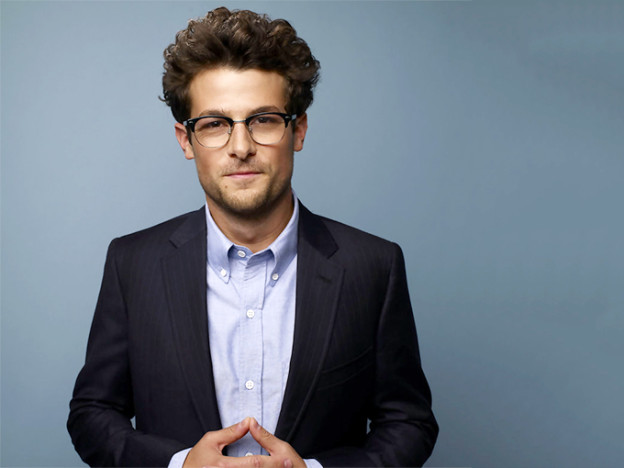Jacob Soboroff is a political correspondent for MSNBC. He has covered elections since 2008, when he began interviewing presidential candidates for his YouTube channel, YouTube Nation. Soboroff is also an outspoken advocate for election reform and actively fights to increase voter participation through the organization Why Tuesday?
You started your career by uploading videos on Youtube and have now transitioned to a traditional media platform on MSNBC. Based on your experience, where do you believe the field of journalism is headed?
I feel like it’s all converging. There is still a traditional television watching audience that is my parents’ age. I think that people who are my age – early 30s and younger – get news from anywhere it comes across. It’s right in front of their face, and I think that it’s on us in the TV business to adapt and not pretend like TV’s not important. Because it is still, arguably, the way most people get their information. [As journalists we have] to use all these other tools to supplement or complement the coverage we’re doing on the air. I love doing things like getting on Facebook Live or taking over MSNBC’s Snapchat or Instagram stories because it’s a very different audience talking about the same subject matter in a totally different way. To me, it actually feels more like how I would talk about those issues at home with my friends.
We’ve seen both candidates begin to use these new digital platforms, especially social media sites like Twitter. Do you think that the political arena will continue to go through a similar transformation as journalism did and increasingly incorporate other media platforms?
I think Donald Trump, actually, is a pretty revolutionary candidate in that regard because so much of the news cycle is driven by what that guy chooses to wake up in the morning and tweet. While I can’t tell you for certain that it’s really him, I think that that guy is unfiltered and that is a radical shift from how we normally experience politicians. I don’t know that there’ll even be anyone else like him anytime soon. For being a 70-year-old, it’s pretty revolutionary how he uses social media.
Do you believe that’s why people are drawn to him as a candidate? As you said, these new methods of communication stimulate conversations about politics at home with friends.
I think it’s part of the attraction. People think he’s a no-BS kind of guy, and part of that is the image that they’re hearing directly from him when he’s sitting in Trump Tower watching television.
Given Donald Trump’s ban on certain publications he perceives as being too biased, how do you try to stay unbiased in your coverage?
I actually don’t believe that anybody is unbiased. I think that every human being comes at life with a certain set of experiences and sees things through a particular vantage point. For people to pretend like they don’t have opinions is unfair and doing a disservice to the audience. It’s my job to show you the facts on the ground, then let you make up your own mind.
It doesn’t mean you’re biased if you have a reaction and you tweet about it; it’s just your vantage point from which you’re experiencing these events. I do think actually it is easier to be yourself on social media than it is on television, though part of my job is to be as myself as possible on MSNBC, which differentiates the coverage I’m doing from stuff that you might see elsewhere.
How would you then respond to Trump? If everyone is biased, how do you react to his attacks on different outlets that make media bias an issue of public discussion?
No, it’s actually surprising for a guy that believes that all press is good press. If I [were] Donald Trump – and he’s certainly not taking advice from me – I think the more voices talking about his campaign, from all perspectives, the healthier it is for democracy. And then of course, people will make up their own minds.
What do you believe is the most important issue that isn’t being covered enough in the election?
I believe we’ve got a deeply flawed democracy in America where for a lot of people, the right to vote is a challenge. It’s like jumping over hurdles to do it. I think our election system is backwards. I don’t think that it’s rigged; I just think that it’s out of date and needs an upgrade. To live up to the title of the most famous democracy in the world, we can’t have a system where we have 50 percent voter turnout. People don’t have confidence that their vote is going to count…There’s absolutely no good reason whatsoever to vote on a Tuesday in the middle of the work week, especially in November. When I was working at Why Tuesday our focus was figuring out how we can make sure there are as few barriers as possible between wanting to cast a ballot – if you’re eligible – and actually going out and doing it.
How would you describe the importance of voting to a young voter who feels frustrated or unmotivated by both parties and their right now?
I would paraphrase Thomas Paine, who said the right to vote is the right to which all other rights are protected. No matter what you care about – whether it’s abortion, guns, education, infrastructure, or war – if you don’t vote, you’re giving up that one way you can speak out the most effectively on all these other issues. I know the voting system can be screwed up and it can be difficult and confusing to vote, but you’ve got to get out and do it.
